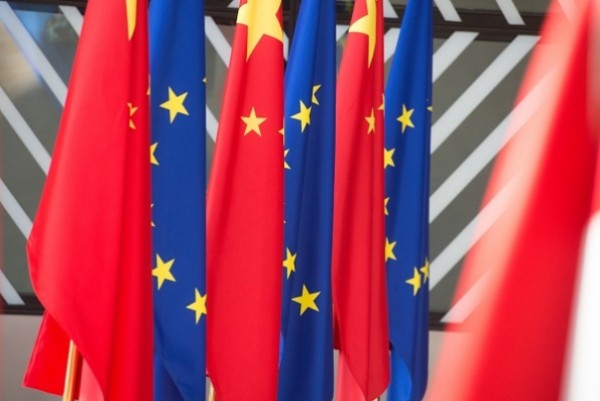| European Commission reviews relations with China, proposes 10 actions | |

| Author: CSEBA / Europea.eu |
| 13th March 2019 |
| BRUSSELS - Against the backdrop of China's growing economic power and political influence, the European Commission and the High Representative review European Union-China relations and the related opportunities and challenges. |
|
Today, they are setting out 10 concrete actions for EU Heads of State or Government to discuss and endorse at the European Council of 21 March. The European Union and China have committed to a comprehensive strategic partnership. Yet, there is a growing appreciation in Europe that the balance of challenges and opportunities China presents has shifted. With today's Joint Communication, the European Commission and the High Representative aim to start a discussion to refine Europe's approach to be more realistic, assertive and multi-faceted. China is simultaneously a cooperation partner with whom the EU has closely aligned objectives, a negotiating partner, with whom the EU needs to find a balance of interests, an economic competitor in pursuit of technological leadership, and a systemic rival promoting alternative models of governance. The EU will use links across different policy areas and sectors to exert more leverage for its objectives. Both, the EU and its Member States can achieve their aims concerning China only in full unity. Vice-President, High Representative for Foreign Affairs and Security Policy Federica Mogherini, said: “China is a Strategic Partner of the European Union. We pursue strong bilateral and multilateral cooperation on files where we share interests, from trade to connectivity, from the JCPOA to climate change. And we are willing to keep engaging robustly where our policies differ or compete. This is the aim of the 10 actions that we are proposing to strengthen our relations with China, in a spirit of mutual respect.” Vice-President Jyrki Katainen, responsible for jobs, growth, investment and competitiveness, said: "EU and China are strategic economic partners as well as competitors. Our economic relationship can be hugely mutually beneficial if competition is fair and trade and investment relations are reciprocal. With this Communication we make concrete proposals on how the EU can act to strengthen its competitiveness, ensure more reciprocity and level playing field, and protect its market economy from possible distortions." Today's Joint Communication proposes 10 action points for the debate: these actions are formulated in the context of relations with China, but some of them relate to the EU's global competitiveness and security. In general, the EU's response will pursue three objectives: Based on clearly defined interests and principles, the EU should deepen its engagement with Chinato promote common interests at global level. Action 1: The EU will strengthen the EU's cooperation with China to meet common responsibilities across all three pillars of the United Nations, Human Rights, Peace and Security, and Development. Action 2: In order to fight climate change more effectively, the EU calls on China to peak its emissions before 2030, in line with the goals of the Paris Agreement. Action 3: The EU will deepen engagement on peace and security, building on the positive cooperation on the Joint Comprehensive Plan of Action for Iran. Action 4: To preserve its interest in stability, sustainable economic development and good governance in partner countries, the EU will apply more robustly the existing bilateral agreements and financial instruments, and work with China to follow the same principles through the implementation of the EU Strategy on Connecting Europe and Asia. Action 5: In order to achieve a more balanced and reciprocal economic relationship, the EU calls on China to deliver on existing joint EU-China commitments. This includes reforming the World Trade Organisation, in particular on subsidies and forced technology transfers, and concluding bilateral agreements on investment by 2020, on geographical indications swiftly, and on aviation safety in the coming weeks. Action 6: To promote reciprocity and open up procurement opportunities in China, the European Parliament and the Council should adopt the International Procurement Instrument before the end of 2019. Action 7: To ensure that not only price but also high levels of labour and environmental standards are taken into account, the Commission will publish guidance by mid-2019 on the participation of foreign bidders and goods in the EU procurement market. The Commission, together with Member States, will conduct an overview of the implementation of the current framework to identify gaps before the end of 2019. Action 8: To fully address the distortive effects of foreign state ownership and state financing in the internal market, the Commission will identify before the end of 2019 how to fill existing gaps in EU law. Action 9: To safeguard against potential serious security implications for critical digital infrastructure, a common EU approach to the security of 5G networks is needed. To kickstart this, the European Commission will issue a Recommendation following the European Council. Action 10: To detect and raise awareness of security risks posed by foreign investment in critical assets, technologies and infrastructure, Member States should ensure the swift, full and effective implementation of the Regulation on screening of foreign direct investment. What next? The Joint Communication will be presented to the European Council on 21-22 March, with the Member States having the first opportunity to exchange views at the Foreign Affairs Council on 18 March. The next EU-China Summit is scheduled for early April. Background The existing policy framework for EU engagement with China is the Council Conclusions on the EU's Strategy on China adopted in July 2016 and the Joint Communication of the Commission and of the High Representative of the Union for Foreign Affairs and Security Policy ‘Elements for a New Strategy on China' of June 2016. This remains the cornerstone of the EU's policy towards China. |
 |
|
| 23rd November 2024 | |
| China has good news for Croatian citizens | |
 |
|
| 7th November 2024 | |
| Pelagos net farm products presented at the Shanghai fai | |